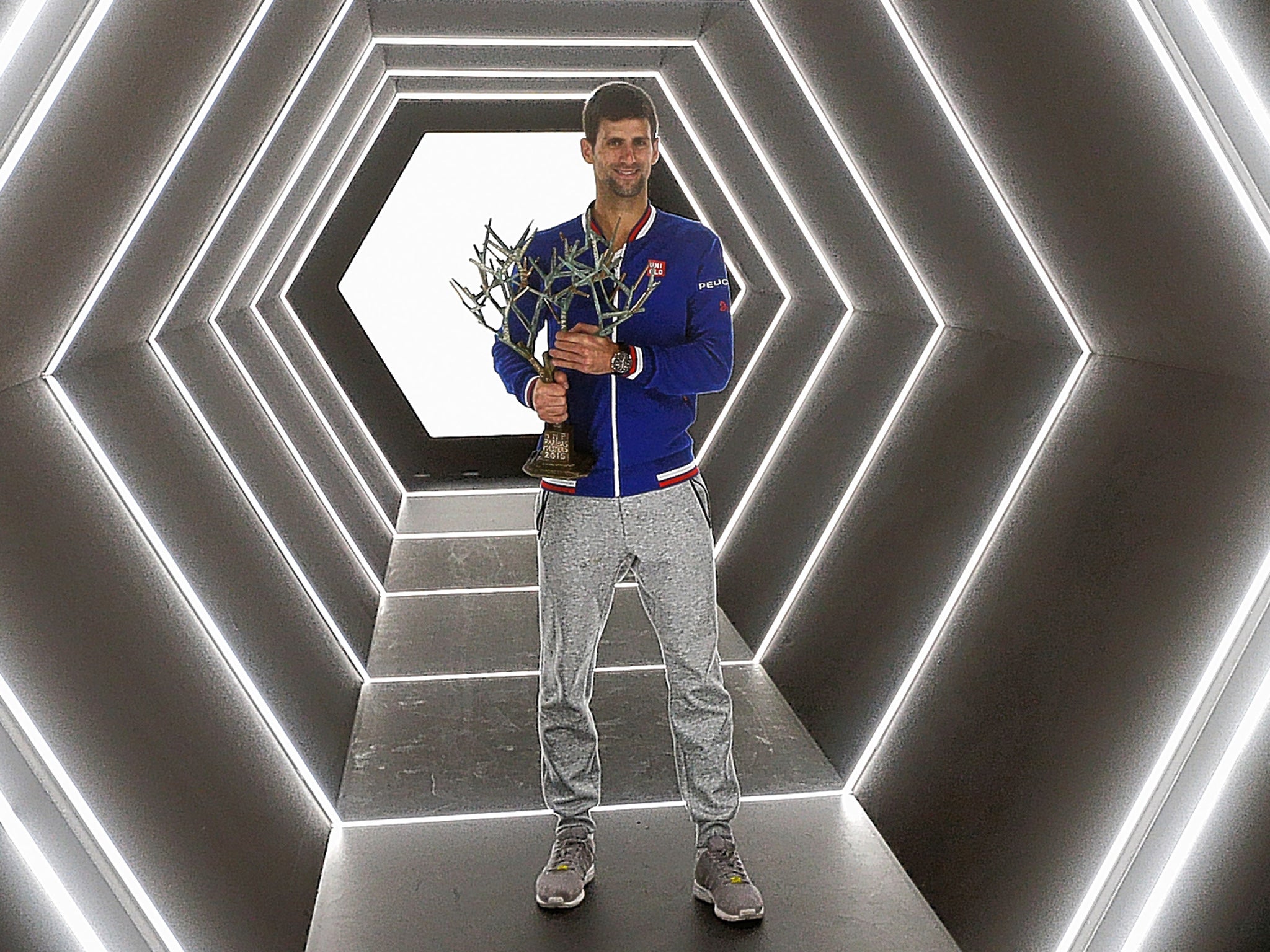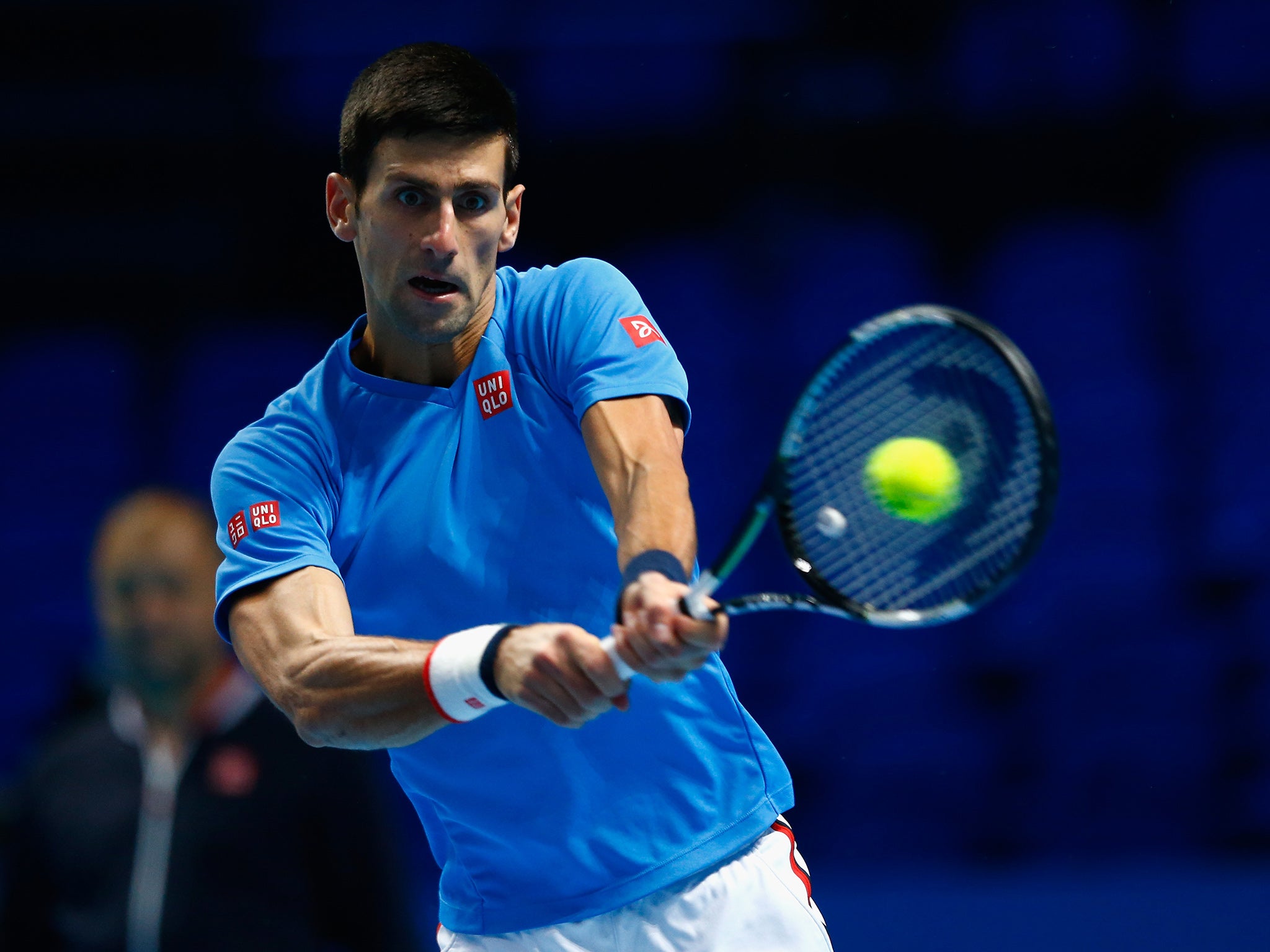Novak Djokovic interview: The World No 1 on his pursuit of perfection
The world No 1 has had a sensational, trophy-laden season and feels he’s in the form of his life, he tells David Cox. However, he believes there’s still room for improvement, off and on the court

Your support helps us to tell the story
From reproductive rights to climate change to Big Tech, The Independent is on the ground when the story is developing. Whether it's investigating the financials of Elon Musk's pro-Trump PAC or producing our latest documentary, 'The A Word', which shines a light on the American women fighting for reproductive rights, we know how important it is to parse out the facts from the messaging.
At such a critical moment in US history, we need reporters on the ground. Your donation allows us to keep sending journalists to speak to both sides of the story.
The Independent is trusted by Americans across the entire political spectrum. And unlike many other quality news outlets, we choose not to lock Americans out of our reporting and analysis with paywalls. We believe quality journalism should be available to everyone, paid for by those who can afford it.
Your support makes all the difference.On a drizzly afternoon in south-west London, the practice schedule for the indoor facilities at Queen’s Club, the venue of the annual grass-court tournament in mid-June, reads like a who’s who in men’s tennis. Roger Federer is up first, drilling backhands at coach Stefan Edberg, followed by the Bryan twins, and then Kei Nishikori. Inside there’s little chatter, just a quiet intensity, and the continuous, relentless crunch of ball on strings.
The question on everyone’s lips is simple. How to stop Novak Djokovic?
The ATP World Tour Finals get under way tomorrow at the O2 Arena, and Djokovic is perhaps as big a favourite to lift the title as anyone in the tournament’s history. Only Federer, during his dominant years of 2004 to 2007, can perhaps compare.
But Djokovic has been recording numbers that even the great Swiss, in his pomp, could not muster. This season he has racked up six of the nine Masters 1000 titles, from the indoor hard courts of Paris to the clay of Rome. It might have been seven had he not elected to take a well-deserved rest during the Madrid tournament. No one has amassed such a haul before in a single season.
And while Serena Williams’ quest for the first calendar Grand Slam since Steffi Graf in 1988 captured the imagination through the summer, until the American’s eventual demise against Roberta Vinci in the US Open semi-final, Djokovic ultimately came closer to the same achievement. If it hadn’t been for a surprise loss to Stanislas Wawrinka in the French Open final, the Serb would right now be holding all four Grand Slam titles.
“It’s the greatest year of my life,” Djokovic says, when we speak. Even more so than 2011, I wonder? After all, that was the breakthrough season in which he won three Grand Slams, Wimbledon for the first time and recorded a remarkable winning streak of 43 matches over five months.
“No question. Of course, Wimbledon 2011 was perhaps the happiest day in my professional career but I feel I’m at my peak now, both physically and mentally. I have the experience now from so many matches, so many moments, and the patience that I perhaps lacked in the past. I guess I just feel more complete in terms of my ability to handle the emotions on the court, not having so many ups and downs in the tough matches.”
It seems strange to hear Djokovic, now typically a picture of almost zen-like serenity on the court, talk of a lack of patience, but when asked what lessons he would teach his sometimes angst-ridden younger self given the chance, patience is the word which repeatedly crops up.
“I had a lot of success very young in my career, winning the Australian Open at 20, but I thought the transition to become a consistent major winner would be smoother and easier than it was,” he reflects. “So that’s where I caught myself up in a little bit of a rush, and it took time and the new grains of maturity you gain from every defeat to understand what I needed to do to reach that next level and become the best in the world.”
Djokovic is now the standard-bearer for men’s tennis, having been at the summit of the world rankings for 171 weeks, putting him at fifth in the all-time list. It’s easy to forget that during his early years on the tour he was often viewed as brash and lacking in humility, compared to Federer and Rafael Nadal. Even now, he doesn’t quite generate the same affection among the wider public as his two great adversaries, as evidenced by the partisan New York crowd during September’s US Open final with Federer.
In person, Djokovic is thoughtful and articulate, as one might expect from a man who dwells so deeply on every aspect of his life in an almost obsessive pursuit of perfection. The same mechanical perfection which has been hewn into every shot, making him more complete than any other player on tour, has been drilled into his lifestyle.
I feel I’m at my peak now both physically and mentally
“Talent is a tiny, tiny component when it comes to making it as a player,” says Djordje Djokovic, at 20 the youngest of the three Djokovic siblings, his eyes widening as he describes the intensity of his elder brother’s training. The Djokovics competed together on tour for the first time, in doubles, at last month’s China Open.
“You learn this lesson quickly in the professional game, and I’ve seen it first hand through the way my brother works. Talent really doesn’t do much at all to determine how far you go in the rankings. It helps you develop your game faster as a junior, but from then on it’s all about how hard you work, and how much you’re prepared to drive yourself.”
At the very top of the tree, it’s the mentality which separates one player from another. Novak Djokovic believes the resilience which has made him nigh invincible this year, giving him win-loss records of 6-1 against Andy Murray, 3-0 against Nadal and 4-2 against Federer, comes from a very introspective place.
“I’ve kept a regular journal now for a long time to keep track of things I’m doing on court, my thoughts about tennis and life in general,” he says.
“It’s nice to have to be able to go back to and analyse what you were thinking before and during a particular match, and what you can learn from that. It helps you prepare and get your mind in the right place before a final. My parents encouraged me to do it when I was travelling as a teenager. I stopped for a few years, because I got lazy but my wife suggested I restart. So I’m doing it occasionally, not every day, but whenever I feel like there is something to note. I hope in future it can be a legacy to help the next generation of players.”

Healthy living in all aspects of life comprises a number of these thoughts. It has become one of Djokovic’s favourite hobby horses, gaining a deeply scientific understanding of how best to fine-tune the mechanics of his body. To aid the digestive processes in the small intestine, he takes a cup of warm water as soon as he wakes around 7am. Later each day, he monitors his urine twice to ascertain his exact level of hydration.
“It’s one of my passions in life, finding better ways to try and improve my health,” he says. “I really enjoy trying to push the boundaries, understanding the limits of how healthy we can actually be. I think that’s a more positive mindset to take. There’s a lot of work being done in understanding the extremes of ill health, the illnesses which can affect us, but what about the other extreme. Is there a way to be more healthy than you are?”
It’s these goals which keep Djokovic motivated and focused on the continuous treadmill of churning out victories across the globe. Apart from a couple of obvious goals (finally winning a coveted Roland Garros title and an Olympic gold medal are his main aims for 2016), he has won almost everything the sport has to offer – 10 Grand Slams, including four in the past two seasons.
With Nadal apparently in decline and marooned on 14 Grand Slams, Federer declared recently that Djokovic has the best chance of beating his record of 17 in the next few years.
“It’s the big challenge, how far I can keep going and how much I can motivate myself to keep playing at this level for many more years,” he admits. “You always try to set new inspirations to keep going to practise and doing the fairly repetitive things day in, day out which tennis requires you to do. Having my son has helped a lot with that in the past year. You can’t ask for a better source of positive energy and motivation than that.”
If Djokovic is to overtake Federer, he will surely have to reverse one of the most defining trends in men’s tennis, as the vast majority of players struggle to enjoy the same levels of success once they turn 30. Only Andre Agassi won more major titles past the age of 29 than he did before.
“I’m excited to try and find out what I’m capable of,” Djokovic says. “It’s a big challenge because I’ve achieved a lot in my career so far but I’m still only 28 and I feel in my legs that there’s many more years to come. Hopefully, I’ll be able to sustain the same level of commitment, concentration, willpower and love for the game which has taken me this far. I just try to approach every single day with a particular purpose, and to aim for perfection. That’s my mindset. Of course, complete perfection is impossible, but if you aim that far, you might just reach excellence.”
Few would deny that Djokovic has done exactly that.
Join our commenting forum
Join thought-provoking conversations, follow other Independent readers and see their replies
Comments